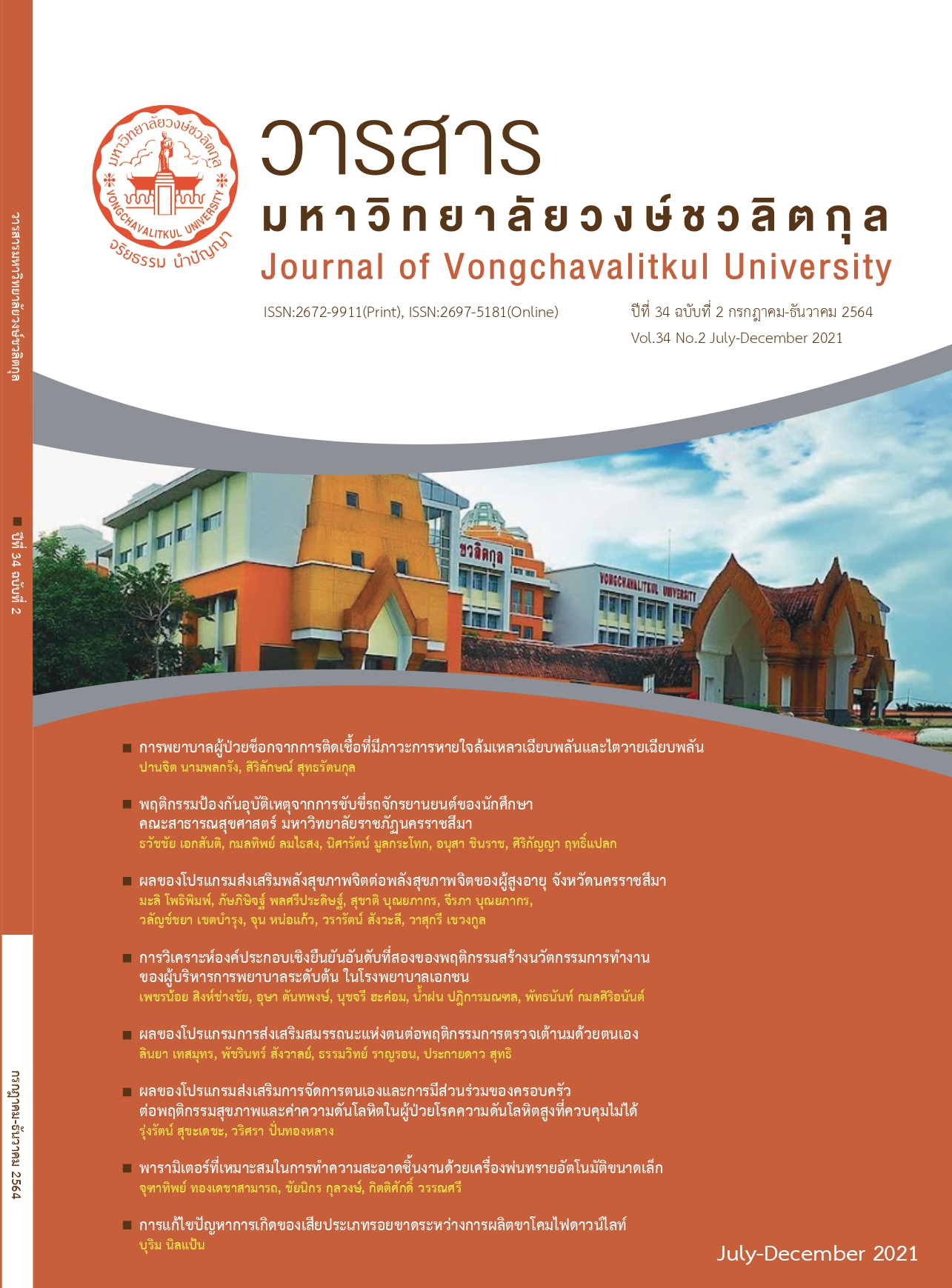The Effect of Self-Efficacy Promoting Program on Breast Self-Examination Behaviors
Main Article Content
Abstract
Objective: This quasi-experimental research aimed to examine the effect of Self-Efficacy Promoting program on breast self-examination (BSE) behaviors among female workers in a university in Thailand.
Methods: The participants were 60 females working in a university, recruited by multi-stage random sampling method. The participants were randomly assigned into the experimental (n = 30) and the control (n = 30) groups. The experimental group received the Self-Efficacy Promoting program based on Bandura, including knowledge about breast cancer and BSE, video presentation, training of breast examination with simulated breast model, and receiving BSE reminder via smartphone application. The instruments for collecting data were questionnaires of BSE behaviors and BSE observation checklist. Data were analyzed by descriptive statistic, dependent t-test, and independent t-test.
Results: The findings revealed that after implementing the program, the experimental group had high mean scores of the BSE behaviors and the BSE correctness ( = 9.80, S.D. = 0.76 and = 31.73, S.D. = 2.91 respectively). The experimental group also had significantly higher mean scores of the BSE behaviors and the BSE correctness than before the experiment (t = 14.08, p <.001 and t = 24.16, p <.001 respectively) and these mean scores were higher than those in the control group (t = 7.35, p <.001 and t = 22.19, p <.001 respectively).
The researchers suggested that this Self-Efficacy Promoting program with BSE reminder via smartphone application can be applied for Thai females to correctly perform and skillful BSE.
Article Details
References
ณัฐณิชา แหวนวงศ์, สุรีพร ธนศิลป์, และ รุ้งระวี นาวีเจริญ. (2558). ผลของโปรแกรมส่งเสริมสมรรถนะแห่งตนต่อพฤติกรรมป้องกันมะเร็งเต้านมในสตรีกลุ่มแม่บ้านทำความสะอาด. วารสารพยาบาลสงขลานครินทร์, 35(1), 21-36.
นวรัตน์ โกมลวิภาต และ น้ำอ้อย ภักดีวงศ์, (2561). เปรียบเทียบ ความรู้ ความเชื่อด้านสุขภาพ และการรับรู้ความสามารถตนเองของนักศึกษาหญิงระหว่างกลุ่มที่ตรวจและไม่ตรวจเต้านมด้วยตนเอง. วารสารพยาบาลสงขลานครินทร์, 38(4), 68-78.
นันทนา คงพัฒนานนท์, ปัญญรัตน์ ลาภวงศ์วัฒนา, และ ณัฐกมล ชาญสาธิตพร. (2563). ผลของโปรแกรมพัฒนาสมรรถนะแห่งตนกับการฝึกอบรมแบบสอนแนะต่อพฤติกรรมในการป้องกัน ทักษะการดูแลและเฝ้าระวังโรคมะเร็งเต้านมของอาสาสมัครสาธารณสุข. วารสารวิจัยสุขภาพและการพยาบาล, 36(1), 112-122.
รังษีนพดล โถทอง, โสภิตตรา สมหารวงค์, ศุลีพร แสงกระจ่าง, ณัฐจาพร พิชัยณรงค์, ปรารถนา สถิตวิภาวี, ศุภชัย ปิติกุลตัง, และ วิศิษฏ์ ฉวีพจน์กำจร. (2562). ปัจจัยที่สัมพันธ์กับการตรวจเต้านมด้วยตนเองของสตรีวัยก่อนหมดประจำเดือน. วารสารโรคมะเร็ง, 39(1), 16-27.
ลินยา เทสมุทร, ศิริรัตน์ โกศัลวัฒน์, กันยา นันต๊ะแก้ว, และ แววดาว คำเขียว. (2561). การสำรวจการตรวจเต้านมด้วยตนเองในบุคลากรสตรีมหาวิทยาลัยพะเยา. วารสารมหาวิทยาลัยคริสเตียน, 24(4), 600-612.
วรรณภา ปาณาราช, กนกพร หมู่พยัคฆ์, และ ปนัดดา ปริยทฤฆ. (2557). ผลของโปรแกรมการส่งเสริมสมรรถนะแห่งตนต่อพฤติกรรมการตรวจเต้านมด้วยตนเองในสตรีวัยรุ่น. วารสารพยาบาลศาสตร์, 32(3), 52-63.
วัชรีวงค์ หวังมั่น, ดวงกมล ปนเฉลียว, และ ทิพย์ฆัมพร เกษโกมล. (2564). ประสิทธิผลของโปรแกรมส่งเสริมสมรรถนะแห่งตนในการตรวจเต้านมด้วยตนเองร่วมกับแอปพลิเคชันไลน์ของนักศึกษาพยาบาล วิทยาลัยพยาบาลบรมราชชนนี จังหวัดสุรินทร์. ราชาวดีสาร วิทยาลัยพยาบาลบรมราชชนนี สุรินทร์, 11(1), 1-14.
สถาบันมะเร็งแห่งชาติ. (2561). ทะเบียนมะเร็งระดับโรงพยาบาล พ.ศ. 2560. กรุงเทพฯ: พรทรัพย์การพิมพ์ จำกัด.
สถาบันมะเร็งแห่งชาติ. (2561). นิยามตัวชี้วัดสาขาโรคมะเร็ง ปี 2561-2565. สืบค้นเมื่อ 20 มิถุนายน 2562, จากเว็บไซต์: https://www.shorturl.asia/y4O3o.
สถาบันมะเร็งแห่งชาติ. (2564). ทะเบียนมะเร็งระดับโรงพยาบาล พ.ศ. 2563. สืบค้นเมื่อ 1 ตุลาคม 2564, จากเว็บไซต์: https://www.nci.go.th/ e_book/hosbased_2563/files/main.pdf.
สรารัตน์ ตระกูลรัตน์ และ จารุวรรณ ไตรทิพย์สมบัติ. (2562). ผลของโปรแกรมการส่งเสริมการตรวจเต้านมด้วยตนเองของสตรีอายุ 45-54 ปี ในเขตชุมชนบ้านห้วยจระเข้ ตำบลหินดาด อำเภอด่านขุนทด จังหวัดนครราชสีมา. วารสารสภาการสาธารณสุขชุมชน, 1(1), 41-52.
สายใหม ตุ้มวิจิตร, สุลี ทองวิเชียร, สุดรัก จิตต์หทัยรัตน์, และ อับดุล การีม ส. อิบลาสิ. (2562). ประสิทธิผลของกิจกรรมเพื่อส่งเสริมพฤติกรรมการตรวจเต้านมด้วยตนเองของสตรีวัยผู้ใหญ่: การทบทวนอย่างเป็นระบบและการวิเคราะห์เชิงอภิมาน. วารสารพยาบาลทหารบก, 20(3), 124-132.
อิโอนา โคอิเกะ, จิราพร ชมพิกุล, บังอร เทพเทียน, และ นฤมล ไม้แก่น. (2561). ปัจจัยที่มีความสัมพันธ์กับการตรวจเต้านมด้วยตนเองในหญิงไทย จังหวัดสมุทรสงคร ประเทศไทย. วารสารสาธารณสุขและการพัฒนา, 16(1), 29-43.
Bandura A. (1997). Self-efficacy: The exercise of control. New York: W. H. Freeman and Company.
Bashirian, S., Barati, M., Mohammadi, Y., MoaddabShoar, L., & Dogonchi, M. (2021). Evaluation of an intervention program for promoting breast self-examination behavior in employed women in Iram. Breast Cancer: Basic and Clinical research, 15, 1-11. https://doi.org/10.1177/ 1178223421989657
Dewi, T. K., Massar, K., Ruiter, R. A., & Leonardi, T. (2019). Determinants of breast self-examination practice among women in Surabaya, Indonesia: an application of the health belief model. BMC Public Health, 19, 1-8. https://doi.org/10.1186/s12889-019-7951-2
Jeon, E., & Park. H. (2018). Development of the IMB model and an evidence-based diabetes self-management mobile application. Healthcare Informatics Research, 24(2), 125-138.
Labrague, L. J., Galabay, J. R., Anatacio, A. L., McEnroe-Petitte, D. M., & Tsaras, K. (2020). Effect of mobile text messaging on breast cancer and breast self-examination (BSE) knowledge, BSE self-efficacy, and BSE frequency: a randomized controlled trial. Scandinavian Journal of Caring Science, 35(1), 287-296.
Park, L., Ng, F., Shim, J. K., Elnaggar, A., & Villero, O. (2020). Perceptions and experiences of using mobile technology for medication adherence among older adults with coronary heart disease: A qualitative study. Digital Health, 6, 1-12. https://doi.org/10.1177/ 2055207620926844
Polit, D. F, & Hungler, B. P. (1999). Nursing research: Principles and methods (6th ed.). Philadelphia: Lippincott.
Shakery, M., Mehrabi, M., & Khademian, Z. (2021). The effect of a smartphone application on women’s performance and health beliefs about breast self-examination: a quasi-experimental study. BMC Medical Informatics and Decision Making, 21, 1-10. https://doi.org/10.1186/ s12911-021-01609-4
Thaineua, V., Ansusinha, T., Auamkul, N., Taneepanichskul, S., Urairoekkun, C., Jongvanich, J., Kannawat, C., Traisathit, P., & Chitapanarax, I. (2019). Impact of regular breast self-examination on breast cancer size, stage, and mortality in Thailand. The breast journal, 26(4), 822-824. (in Thai).


